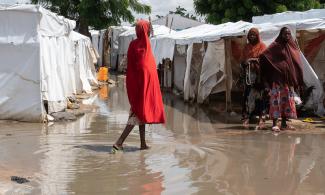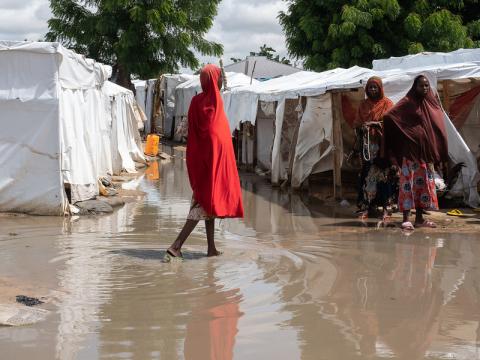
According to NRC's assessments, over 6,800 people living in
displacement camps in Maiduguri have been impacted by floods in recent
weeks. In Dikwa, 500 people have been rendered homeless due to
flooding and have set up home in disused registration centres.

Torrential rain has destroyed makeshift tents and caused severe
flooding to temporary displacement camps in northeast Nigeria, leaving
vulnerable families homeless.
The Norwegian Refugee Council (NRC) said it was worried about the
situation and thus appealed for "urgent financial assistance" to
address the colossal humanitarian needs and to prevent the spread of
deadly cholera.
“Displaced people are suffering due to relentless rains and wind
battering their homes the last few days. Large numbers of families,
who fled from conflict months ago, are left homeless while others are
forced to share overcrowded tents with neighbours or relatives,” said
Eric Batonon, Country Director for NRC in Nigeria.
According to NRC's assessments, over 6,800 people living in
displacement camps in Maiduguri have been impacted by floods in recent
weeks. In Dikwa, 500 people have been rendered homeless due to
flooding and have set up home in disused registration centres.
“They are essentially displaced within a displacement camp,” Batonon added.
“My home is completely destroyed. My floor has turned to mud and water
is everywhere. The rain keeps coming and we do not have any choice but
to wait for it to stop or share with others,” said displaced
mother-of-four Fatima Mohammed (30).
The Adamawa State government, the organization said, had officially
declared an outbreak of cholera in three local government areas during
the rainy season.
The total number of cases reported as of August 16 stands at 633.
Four people have so far lost their lives to the disease. Due to recent
heavy rain and flooding, more cases could be confirmed over the coming
weeks, the NRC pointed out.
“Displaced people are living in sub-human conditions across the
region. There are no sanitation or drainage facilities in most camps.
People are going to the toilet in open spaces because there are no
facilities for them to use and now that the camps are filled with
stagnant floodwater, water-borne diseases like cholera quickly
spread,” Batonon added.
Meanwhile, the United Nations and partners have appealed for $848
million to address the needs in northeast Nigeria this year. About
eight months into the year, less than 40 per cent has been received.
“Additional financial support is urgently needed to reach the 6.2
million people targeted for humanitarian aid in 2019. People will die
if they don´t receive urgent assistance now,” Batonon said.
Furthermore, heavy rain periods present opportunities by armed groups
to infiltrate and target displacement camps.
On Tuesday night (August 20) in Dikwa, a female suicide bomber
detonated a bomb, killing herself and injuring four civilians.
This was the first attack of its kind in the area since December 2018.